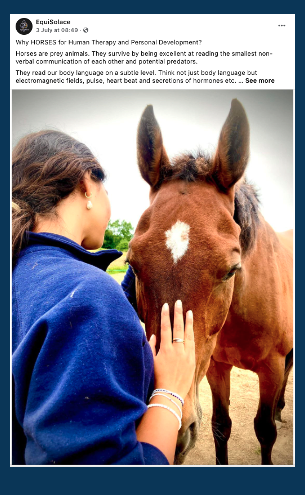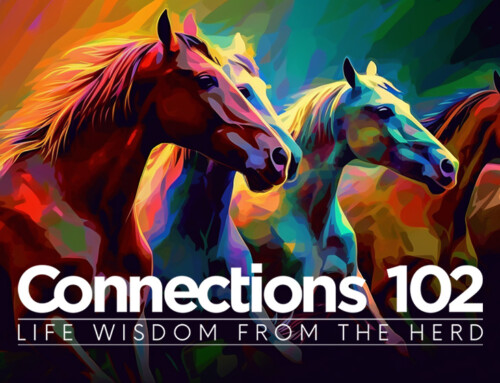Join us as we talk with Lydie Glendinning, who is putting both her IFEEL Level 5 EFHD and Level 6 EFPT training to good use. She provides Equine Facilitated Psychotraumatology for individuals and groups, and has found herself often working with those who might have fallen through the gaps in the system.
What were you doing before studying with IFEEL?
I was preparing as much as I could for completing an Equine Facilitated Psychotherapist course. I studied Psychology at Swansea University, which is one of the biggest psychology and medicine research Universities in the UK, so I of course signed myself up for as many guinea pig studies as I could, immersing myself in learning about mental health and psycho-bio-social constructs. I also had the amazing opportunity to study Neuroscience at Trinity Collage University in Dublin, where I was able to gain an in depth understanding of the brain, with human donor specimens. This all provided me with the perfect backbone to build my knowledge upon.
What made you decide to study at IFEEL?
After continued research over my teenage and young adult life, I decided to study at IFEEL, as on paper it was the most prestigious course. With their full accreditation and regulation process, providing the most hours in in person training, client practice hours and required studying, it was a no brainer to explore them more. On attending the prerequisite online taster day, in person workshop and one to one zoom call with their clinical lead, it became evident that IFEEL was the right match for me in the flesh as well.

The major aspects that stood out was how highly skilled and experienced the faculty team was. I was blown away with their knowledge, at the forefront of the industry, creating a more standardised and evidence based Equine Assisted Services training program and treatment process. In addition, I was in awe of how they were teaching the complex information that you immediately dive into and the change process they were supporting in all the attendees. They made mind blowing, new concepts that are now vital life skills of mine, so accessible to understand. It was obvious that they had carefully condensed a huge amount of information into a digestible form, so that even if people didn’t continue onto the training programme, the mental health information and individually supported deep change process would create a big impact for people’s everyday life.
How was the support throughout the course?
The support was outstanding and prevalent across the whole spectrum of the course. From being provided with a mentor and having regular 1:1 sessions built into the programme and paid for within the course fees; to genuine care from all the faculty members at all times, wanting to fully assist and encourage in whichever way they could. An elaborate, considered approach unique for each student – faculty balancing when to provide reassurance and when to push for growth and development. This approach of support helped me to feel confident in my skills as a facilitator, and ready to begin practice after completing the training.
Whilst on the course, the other students played a huge part of the program support system. A group of individually very different people, wanting to do different things with the course, created powerful connections and a friend group for life. Regularly practising facilitator-client skills with each other will always be a cherished memory for me and a deep bond forms our group to this day. Now qualified colleagues we meet up regularly for continued support, learning and skills sharing, which we plan to continue throughout our careers. The course provided the perfect environment for organic safe community, learning, healing and self-development to occur.

As a horse owner prior to the course, was it worth doing an equine specified program rather than a more traditional psychotherapist course?
Where do I even begin to explain the in-depth information about horses that I have learnt from this course! Firstly, the vigorous learning of how to incorporate horses into a client session whilst ensuring equine welfare, agency and containment was paramount, as the client environment is very different to any other experience I have had with horses. Whilst researching other forms of training programmes, IFEEL was promoting the highest quality of horse consideration in the client environment. Secondly, the deep dive into equine knowledge, relational horsemanship philosophy, species appropriate environments and welfare has been incredible. They are really at the top of the game in providing the most recent, up to date information that is out there, and going above and beyond for ensuring equine welfare in the industry. With their involvement in the setting up of the Human Equine Interaction Register (now known as EASP), they are very involved in changing how we interact with horses in general, showcasing how horses should be treated for the current social license crisis of the equine industry.
What is your area of practice, what clients do you work with and what region of the UK do you work in?
I am currently working with a lot of young people and minority groups, providing Equine Facilitated Psychotraumatology – people who are tending to fall through the gaps of the system. I work on our beautiful site 1:1 and in groups in East Sussex, as well as online Psychotraumatology sessions.
To find out more about Lydie’s practice visit her EquiSolace practise page on Facebook







